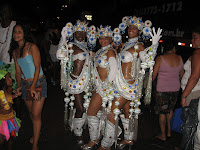A quick update on the way back: I caught my cold from the wonderful air co in the plane from Rio to Sao Paolo, there the flight was almost cancelled and we enthusiastically volunteered to stay behind, but unfortunately there was still room last minute. We had two overnight flights during which it was impossible to sleep (films watched: Running with scissors, Volver and Babe
 l).
l).The day in between we spent in Washington, where we walked around for five hours to see all the presidential and war memorials. Not enough time in Washington, but it was very interesting. In general we felt a lot of the memorials were celebrating victory more than commemorating death and one sided; at the Roosevelt memorial It mentioned the bombing of Pearl Harbour, but not a word about the nuclear bomb or other non-American victims.
It was just too weird to be surrounded by snow, while the day prior we had been lying on the beach. But I guess that is modern times: one day you are at the beach in Rio, the next in the city centre of Washington and the one after that in the outskirts of Amsterdam, sleeping...
I have been thinking of how to conclude this travel blog properly. It is too early to start looking back. One way to round off my last entry here is to look back at the several questions I have been asked, which I have answered personally, but why not make it public (censored of course-sorry took the names out..),..
Most frequent questions asked were by the way:
Where are you now? And when are you coming back?
-: How is the journey? Is it what you expected it to be?
-: by the way hows the crime scene where you're at?
For some reason South-America had been a very old dream of mine.
Why exactly, I don't know. Well, I like travelling and it sounds exotic, but it is
still a culture that might be understandable, seen its European origin.
When planning the trip it still stayed an abstract idea. Sure, we planned a route, prepared ourselves for all kinds of weather and bought loads of medication.
I got warnings about drugs, violence, the men, food poisoning, scam artists, theft...
These warnings did not stop while travelling, but even though we got ill, none of that threatened us. Partly because stories are exaggerated, we were very careful and we were simply lucky.
Buenos Aires and Chile: looks and feels very European, familiar
North of Argentina, Peru and Bolivia: poorer, indigenous culture
Brazil: different language, different mixture, different culture
I am constantly asked about high points. I think answering that is both hard and simple: the local people, who showed us around, invited us in or simply told us about their life.
I also enjoyed greatly the several hikes we undertook in Chapada de Diamantinha (Brazil), the volcano in Pucon (Chile) and Torres del Paine (Chile). Then there are of course the famous tourist points, that are famous for an obvious reason: they are breathtaking: the Iguazu falls (Argentina), Machu Picchu (Peru), the glacier in El Calafate (Argentina), the salt flats of Uyuni (Bolivia), the carnival of Brazil and many more sites..




In short: what this trip did was enabling me not to have a regret later for not doing such a thing and showing me that actually anything is possible, question of doing it!
-: How do you get along with your sister? Are you together all the time or do u sometimes go out and do stuff when the other one wants to stay inside?
We were practically always together and shared every moment and illness. No, we never fought, even though it would happen that we would snap at each other for a few minutes when tired & hungry, but that was really it. Well..we had a lifetime of practice...
-: And where is base camp? London ? Amsterdam... or wherever your family is?
Home is where your backpack is...Right now it is here, in Holland, but I do hope to take it back to London. I do believe that home is where your heart is, even if it means moving in between two places (or more). It is hard, but I also consider it a luxury. I am not entirely sure where to place London at this very moment, it feels far, it is entirely up to me to create my own home there. Anyone got a job & house for me, by any chance?!
-: Been meaning to ask you how it's going not eating meat out there? Guess it's ok cause there's a fair amount of fish depending on where you are. Do you eat shellfish?
No shellfish for me. Still a vegetarian, but it was hard at times. Not even so much because the steaks looked great in Argentina, but hard because sometimes there wasn't much else (= just rice) to eat. On the boat to Belem (Brazil) I did eat some of the meat soup, as I did not want to go to sleep hungry, but I couldn't force myself beyond a few bites. Nothing wrong though with the way South-Americans treat their animals btw. Lost weight (and strength), that is for sure!
-: any prospects on a new job?
Have not started looking yet and no offers! I am looking for a job into Publishing..anyone?
-: Heard that you are going to Nahum this summer ?
I really really do want to go to Israel this summer, but it is going to depend on my job situation, as I am sure no new boss will be thrilled if I asked for 3 weeks off after a month...





 We are flying homewards tonight!
We are flying homewards tonight!




